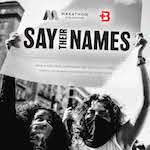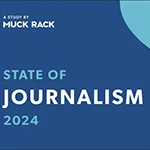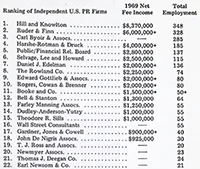 |
A report from Marathon Strategies, along with cultural consultancy BLK+Cross, looks at how much social media drive legislative action when it comes to social justice reforms.
“Say Their Names” measures the number of online conversations about police reform in each of the 50 states and Washington, D.C. It then compares that number with the volume of reform measures proposed, enacted or sought in each state. The study also accounted for whether or not a state’s legislature was in session.
For the most part, the report finds that a higher level of online conversations about the issue can be tied to how energetically a state’s politicians address it.
Of the states with legislatures in session, Minnesota, where the killing of George Floyd took place, saw the most online conversations about social justice by a wide margin—with over 10 million recorded. The state’s legislature also produced the most bills and measures (51) focused on police reform.
Several other locales in which over one million online conversations about the issue took place also saw a high level of legislative activity. Georgia recorded more than two million such conversations, which correlated to 18 bills or measures. New York (1.7 million conversations, 26 bills/measures) and Washington, D.C. (1.5 million conversations, 15 bills/measures) exhibited a similar connection.
In most states that saw less than 400,000 online conversations on the issue, the number of bills or measures also lagged. Two exceptions: Colorado, where 13 bills/measures followed 330,947 conversations, and New Jersey, which had 148,896 conversations and also recorded 13 legislative actions.
For states where the legislature was out of session, Kentucky stood out for having a very high number of conversations (7.6 million, second only to Minnesota), but just two proposals and one executive action being put on the table. Generally, the relationship between the amount of conversations and degree of political action held steady.
To collect their data, Marathon analyzed a number of what it calls “social justice keywords,” which included the names of police brutality victims and names of politicians.
“This report illustrates the power of digital amplification to enact change at all levels of government,” said Marathon CEO and founder Phil Singer. “These findings indicate that the nationwide online discussion of social justice issues has been effective in delivering legislative proposals and reforms while demonstrating that anyone who wants to drive policy change must be paying close attention to what’s being said online about the issue.”
To access the full report, click here.


 Brand has a powerful effect on a company’s valuation, but the level of brand understanding in the investment community leaves a lot to be desired, according to a new study from Brodeur Partners, Interbrand and NewtonX.
Brand has a powerful effect on a company’s valuation, but the level of brand understanding in the investment community leaves a lot to be desired, according to a new study from Brodeur Partners, Interbrand and NewtonX. AI may still be viewed with a wary eye by most media pros, but its use is growing, according to a new study from Muck Rack.
AI may still be viewed with a wary eye by most media pros, but its use is growing, according to a new study from Muck Rack. A new study from Walker Sands says that some marketers have been putting the cart before the horse when it comes to the relationship between marketing channels and business outcomes.
A new study from Walker Sands says that some marketers have been putting the cart before the horse when it comes to the relationship between marketing channels and business outcomes. Thought leadership can make made B2B brands more "powerful and attractive to buyers," according to Edelman report.
Thought leadership can make made B2B brands more "powerful and attractive to buyers," according to Edelman report. The deadline for O'Dwyer's 2024 rankings of PR firms, a benchmark study of the growth of the industry annually since 1970, is Mon., Mar. 11, 2024.
The deadline for O'Dwyer's 2024 rankings of PR firms, a benchmark study of the growth of the industry annually since 1970, is Mon., Mar. 11, 2024.


 Have a comment? Send it to
Have a comment? Send it to 
No comments have been submitted for this story yet.